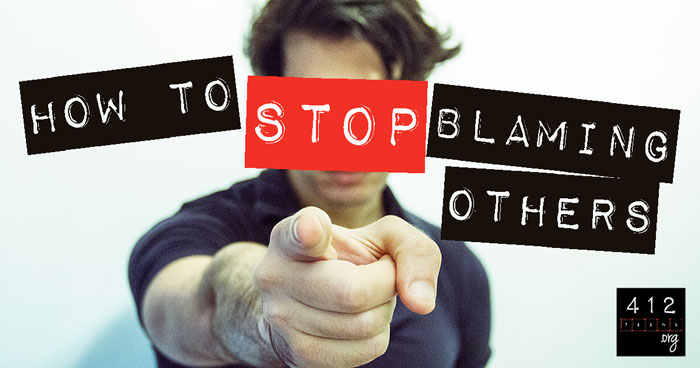How can I stop blaming others?

Sometimes it feels like the world is stacked against us. Problem after problem, inconvenience after inconvenience—it all builds up until someone cuts in front of us in line, then...kablewy. Suddenly, everything is this person's fault. They made me mad. They tested my patience. They made me late for the thing.
Blaming others is a way of redirecting our negative feelings and/or erasing our responsibility or part in bad circumstances. It's hard to admit our mistakes, isn't it? Putting the blame on someone else may seem like an easy way out, but it is not loving or humble behavior. Part of maturing in our faith is taking responsibility for our own actions and responses—especially when something goes wrong. If blaming others is a regular behavior pattern in our lives, then we need to closely examine our hearts.
How to Stop the Blame Game
No one likes hearing they're wrong or that they've made a mistake. Strong emotional pain often makes slowing down and examining the situation nearly impossible. Humility can be difficult to practice in those situations. But as Christians, we are to be humble and take ownership of our own wrongdoing (Colossians 3:12; Matthew 5:3, 21-24). Here are some steps for interrupting and redirecting the thought process that leads to blaming others:
Steps to Stop Blaming Others:
- Recognize the problem. Before we even think about who is responsible, we must first acknowledge that there IS a problem and that it needs resolution. Ignoring the problem won't make it go away. Once we accept it, we can better address it, choose appropriate responses, then move on.
- Check your pride. Pride can blind us to our mistakes. If we've made a mistake, we should humble ourselves and admit it. By acknowledging our fault, we open the door to resolution and healing (James 5:16).
- Lower your expectations. Sometimes we place unreasonably high standards on ourselves and others—standards that are impossible to live up to. This may make us more sensitive to offenses or perceived wrongs. Instead of passing the blame onto another person (or onto ourselves!) for what "should" have been done, we must get into the mindset of compassion, mercy, and forgiveness (Luke 6:36; Ephesians 2:4-5). Wallowing in the "blame game" solves nothing.
- Pray. Instead of shooting blame at others, we can choose to pray for everyone involved in the situation. If you truly feel they're wrong, ask God to help them in whatever areas they're struggling with (Matthew 5:44). If you find that you might the one responsible, ask God for forgiveness (1 John 1:9). Either way, ask God for wisdom on how to move forward (James 1:5).
- Choose humility and gratitude. The Bible tells us that a good way to stop blaming others is by being humble. Humility is defined as "freedom from pride or arrogance." Humility and entitlement cannot coexist. Instead of focusing on what inconvenienced or hurt us, we should focus on being thankful for what we have and what God is teaching us through these circumstances (1 Thessalonians 5:18).
- Focus on the good. Many of us tend to focus on the negative rather than the positive. But God sees potential in every circumstance (Romans 8:28). Even the biggest disappointments and tragedies can glorify Him. Take a moment to reflect on what God is teaching you in moments of frustration, disappointment, and anger. (NOTE: We are NOT talking about toxic positivity here; that's something different and not helpful.)
- Accept responsibility for the part you played. This is truly the key to resisting the temptation to blame others. When we accept personal responsibility for our own actions rather than blaming others for what we've done, we are choosing humility and Christlikeness (Philippians 2:3; Romans 12:16). Taking responsibility for our own faults is a sign of spiritual growth and reflects Christ (Galatians 5:22-23).
What if it really IS their fault?
If we have examined the situation and find that another person is truly responsible, then the Bible gives us steps to resolve the conflict (Matthew 18:15-17). First, we need to talk to that person privately, gently and lovingly explaining the offense or mistake. Give them a chance to speak and make efforts to genuinely listen. They may come around, and peace will be reestablished.
If they refuse to listen one-on-one, then we can take a friend or two who can mediate the discussion. We ought to maintain respect, mercy, and compassion because we all know how hard it is to be called out and admit our mistakes.
If they still refuse to reconcile, then we can advance to authority figures in our lives—such as parents or a pastor at church. If they continue to deny responsibility, then we must let them be and waste no more energy in trying to resolve the issue. We can put the matter completely in God's hands and free ourselves from the responsibility of resolution.
Of course, conflicts aren't always resolved easily. Sometimes the other person wants to play the blame game even if you aren't, and there's not much you can do to change their mind.
There IS one more option though, and once again, it requires humility from us. Instead of taking offense or trying to make someone admit responsibility, we could extend love and forgiveness—just as Jesus does for us (1 Peter 4:8; Colossians 3:13). Forgiving others, even if they don't "deserve" it, glorifies God's mercy and grace (Luke 6:36; Ephesians 2:4-5). Instead of focusing on how the other person made a mistake, we could focus on their feelings of shame and hurt, seeing things from their perspective. When we shift our goal from finding the "culprit" to helping another in love, we can overlook honest mistakes.
Overlooking an offense requires us to extend grace to the person who has offended. Proverbs 19:11 says, "A person’s wisdom yields patience; it is to one’s glory to overlook an offense." Truthfully, no one "owes" us anything. Being included, understood, or respected by others was never a promise. Jesus tells us to "turn the other cheek" when wrong is done to us (Matthew 5:38-48; Romans 12:20). This isn't to say we shouldn't be wise with whom we trust, but forgiveness is separate from trust (Matthew 10:16). Ultimately, our responsibility is to hand the conflict over to God and trust Him to resolve it in His wisdom and timing.
Above All Else: Humility
Regardless of whose "fault" it is or who made the mistake, as followers of Christ, we should always strive for humility, honesty, and lovingkindness in how we treat each other. We shouldn't make ourselves scapegoats for every mistake that happens, nor should we place blame on others when we are clearly in the wrong. Mistakes do not make people "lesser" or less valuable to God. When emotions run high and things are off the ideal path, take a moment to breathe. Ask God for wisdom and help in honestly examining the situation for truth (James 1:5), then respond in a way that honors and glorifies Jesus (Galatians 5:22-23).
REFERENCES: 1. Definition of humility. (n.d.). In Dictionary by Merriam-Webster: America's most-trusted online dictionary. https://www.merriam-webster.com/dictionary/humility [Accessed 7-10-2023]
ALSO SEE:
- How can I avoid being a diva?
- Does the Bible say to forgive and forget?
- What does the Bible say about anger?
- How can I forgive those who sin against me?
- How can I be more humble?
- How can I stop taking offense at little things?
- What do I say when someone morally offends me?
- What does the Bible say about grudges?
- What does it mean to walk in the Spirit?
- What does the Bible say about patience?
- What does the Bible say about dealing with mean people?
- Is it wrong to be annoyed by people?
- What does the Bible say about white lies?
- How can I find joy during hard times?
- What does the Bible say about pride?
- What does the Bible say about dealing with toxic relationships?


TL;DR
Blaming others is a way of redirecting our negative feelings and/or erasing our responsibility in bad circumstances. Putting the blame on someone else may seem like an easy way out, but it is not loving or humble behavior. Regardless of whose "fault" it is or who made the mistake, as followers of Christ, we should always strive for humility, honesty, and lovingkindness in how we treat each other (Ephesians 4:31-32). We shouldn't make ourselves scapegoats for every mistake that happens, nor should we place blame on others when we are clearly in the wrong. Mistakes do not make people "lesser" or less valuable to God. Even if a person has truly wronged us, we should strive for understanding and forgiveness (Matthew 18:21-22). When emotions run high and things are off the ideal path, take a moment to breathe. Ask God for wisdom and help in honestly examining the situation for truth (James 1:5), then respond in a way that honors and glorifies Jesus (Galatians 5:22-23).

Writer: Vivian Bricker
Vivian loves learning, studying the Word of God, and helping others in their walk with Christ. She is dedicated to helping people learn more about Jesus and is ready to help in any way she can. Her favorite things to do are spending time with her family and friends, cooking, drawing, and spending time outside. When she is not writing, you can find her soaking up the sunshine or going on an adventure.

Writer & Managing Editor: Catiana (Cat)
Cat is the web producer and managing editor of 412teens.org. She is known as "412teens" on the 412teens Discord. She loves audiobooks, feeding the people she cares about, and using Christmas lights to illuminate a room. When Cat is not cooking, gardening, or practicing creativity, she enjoys spending time with her two adult kids, six socially-awkward cats, and her amazing friend-amily.
